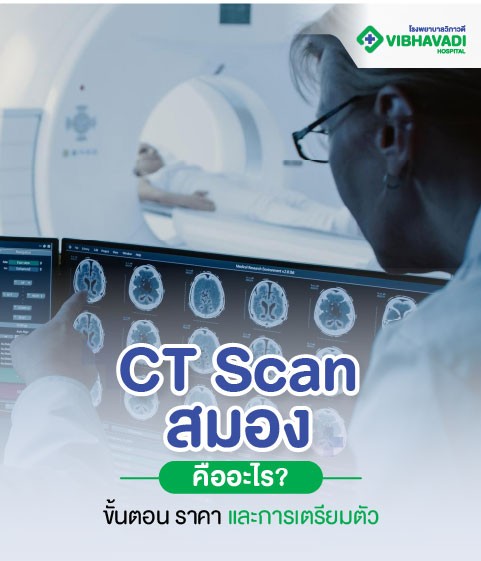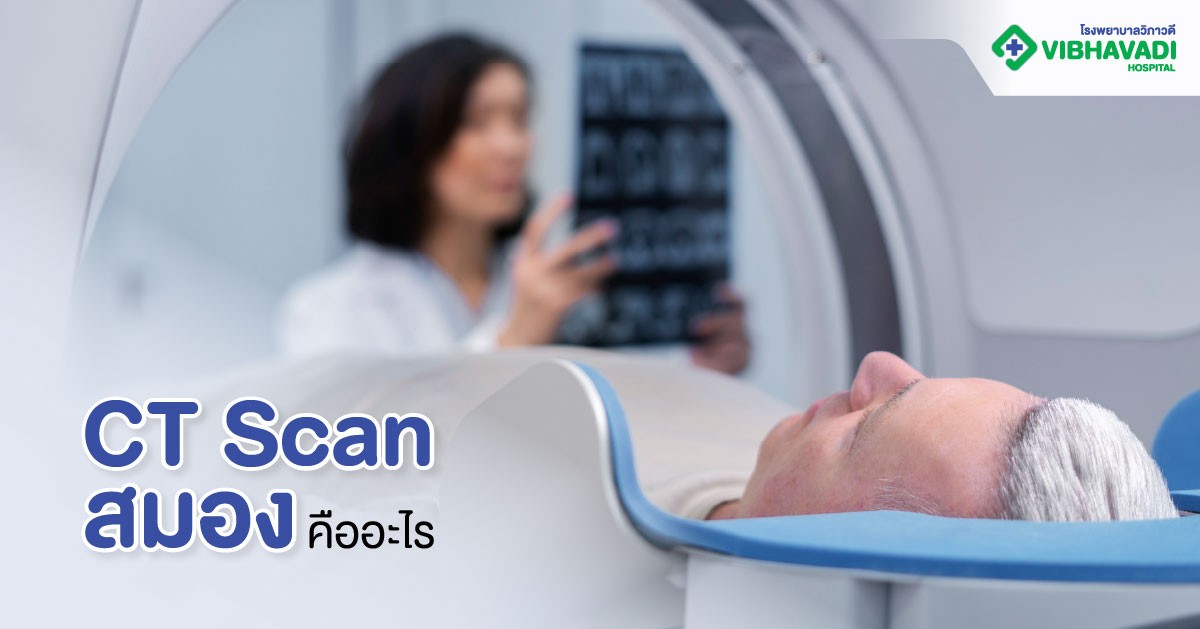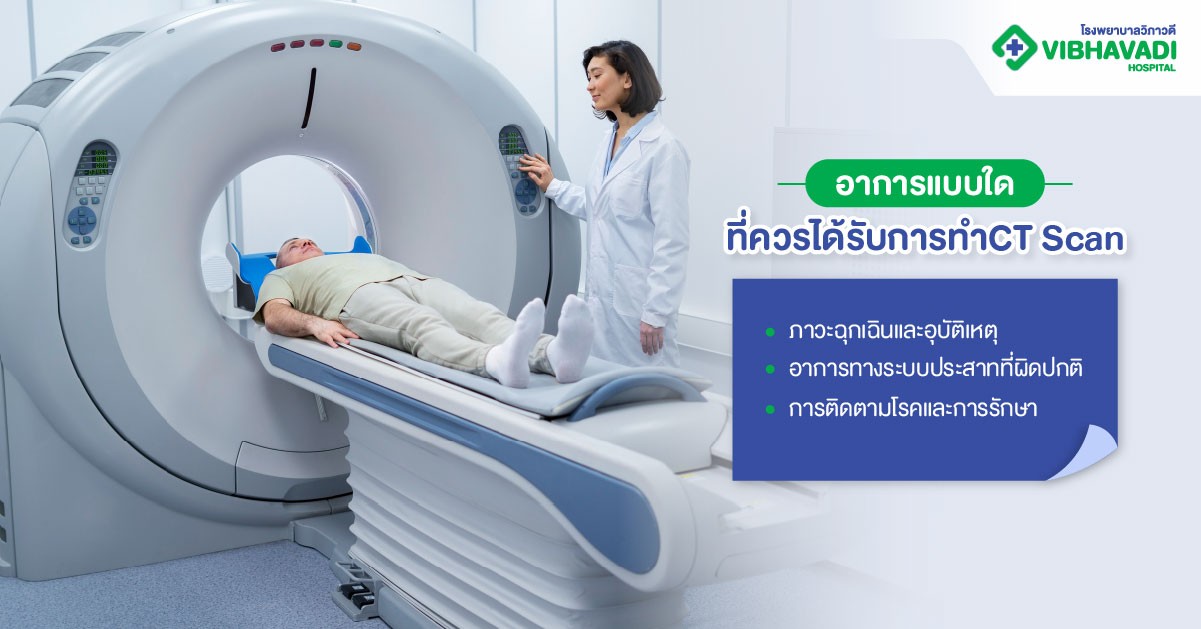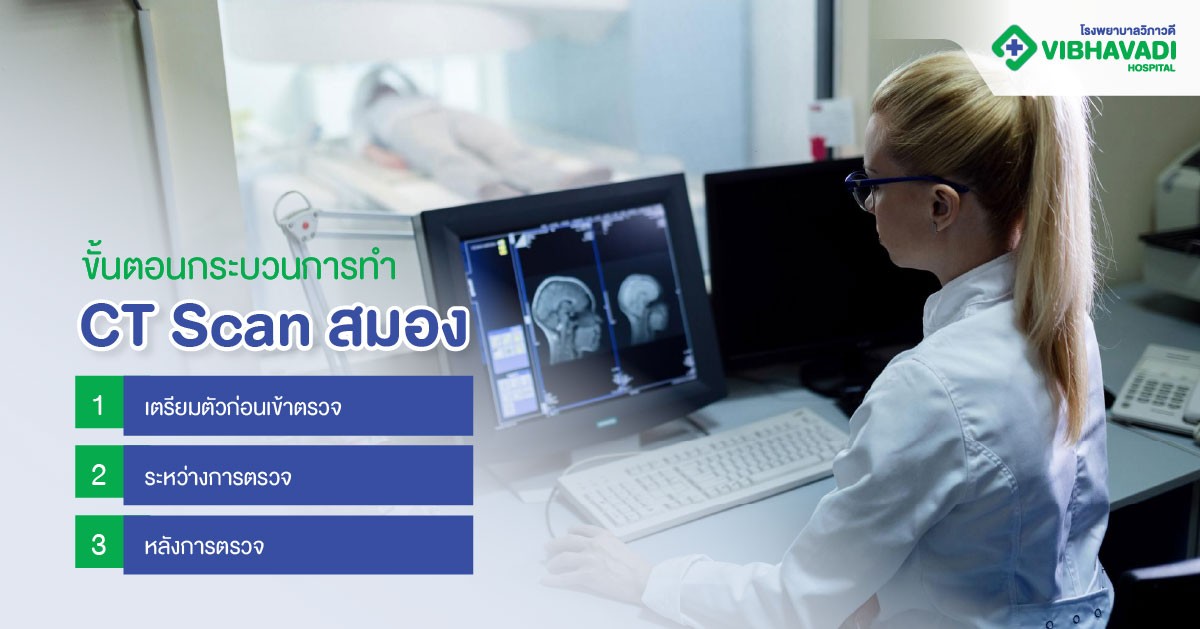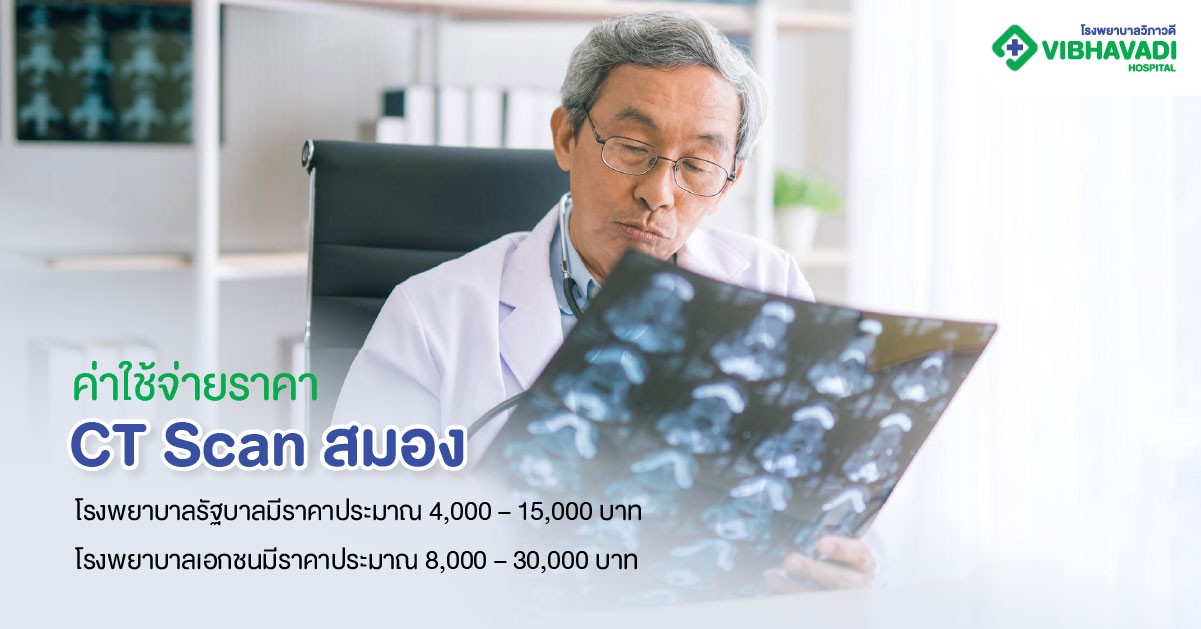CT Brain Scan Preparation
A CT Brain Scan (Computed Tomography of the brain) is a vital imaging tool that helps detect structural abnormalities, brain injuries, strokes, tumors, and other neurological conditions. At Vibhavadi Hospital, we offer state-of-the-art CT scanning technology backed by a team of experienced radiologists and neurologists. Our advanced imaging capabilities allow for fast, non-invasive, and highly accurate diagnosis to support timely treatment decisions for patients experiencing neurological symptoms.
What Is a CT Brain Scan?
A CT brain scan uses X-ray technology combined with computer processing to create cross-sectional images of the brain. Unlike regular X-rays, which provide only a flat view, CT scans can show detailed images of soft tissues, blood vessels, and bones in the head.
This imaging method is commonly used to assess:
-
Head trauma or injuries
-
Stroke and bleeding in the brain
-
Brain tumors or cysts
-
Brain swelling (edema)
-
Hydrocephalus
-
Skull fractures
-
Brain infections or abscesses
Why Choose Vibhavadi Hospital for Your CT Brain Scan?
High-Speed Multi-Slice CT Scanners
Our hospital is equipped with multi-slice CT scanners that allow for quick image acquisition with high resolution, reducing scan times and improving diagnostic precision.
Experienced Radiology Team
Our board-certified radiologists and neurologists collaborate closely to interpret results with accuracy, ensuring comprehensive evaluation and diagnosis.
Patient-Centered Safety Protocols
We use low-dose radiation techniques and rigorous quality control to minimize patient exposure while preserving image quality.
Immediate Results and Diagnosis
For emergency cases such as stroke or head injury, we provide real-time imaging and rapid interpretation, ensuring patients receive immediate care and interventions if needed.
Who Should Get a CT Brain Scan?
You may need a CT brain scan if you experience any of the following symptoms or conditions:
Symptoms
-
Sudden severe headaches
-
Loss of consciousness or fainting
-
Seizures
-
Sudden vision changes
-
Numbness or weakness, especially on one side
-
Difficulty speaking or confusion
-
Head trauma from accidents or falls
Medical Conditions
-
Suspected stroke or transient ischemic attack (TIA)
-
Traumatic brain injury (TBI)
-
Brain tumors
-
Neurological infections such as meningitis or encephalitis
-
Monitoring known brain conditions
CT Brain Scan Procedure at Vibhavadi Hospital
Before the Scan
-
You may be asked to remove metal items like jewelry or eyeglasses.
-
If contrast dye is required, you may need to fast for 4–6 hours prior.
-
Inform the technician of any allergies or existing medical conditions, especially kidney problems or pregnancy.
During the Scan
-
You’ll lie on a motorized table that slides into the CT scanner.
-
You must remain still during the scan, which typically lasts 5–15 minutes.
-
If contrast is used, it will be administered via an IV injection to enhance blood vessel visibility.
After the Scan
-
You can usually resume normal activities immediately.
-
If contrast dye was used, drinking water can help flush it from your system.
-
Scan results are typically available within a few hours and will be reviewed by your doctor.
Contrast vs. Non-Contrast CT Brain Scans
Depending on your symptoms or condition, your physician may order either a non-contrast scan or one that uses intravenous contrast dye.
-
Non-contrast CT is often used for trauma, stroke, or bleeding detection.
-
Contrast-enhanced CT provides better visualization of tumors, infections, or vascular abnormalities.
At Vibhavadi Hospital, our team evaluates the medical necessity of contrast use, prioritizing patient safety while enhancing diagnostic clarity.
Advantages of CT Brain Scans
-
Fast and painless procedure
-
Excellent for detecting acute conditions like stroke or trauma
-
More widely available and quicker than MRI
-
Useful in emergency settings
-
Can be repeated if needed for monitoring
CT Brain Scan vs. MRI Brain Scan: What’s the Difference?
| Feature | CT Scan | MRI Scan |
|---|---|---|
| Speed | Fast (5–15 mins) | Slower (30–60 mins) |
| Radiation | Uses low-dose X-rays | No radiation |
| Image detail | Better for bone and acute bleeding | Better for soft tissues and nerves |
| Availability | Widely available and less costly | Higher cost and longer wait times |
In cases of acute trauma, suspected bleeding, or stroke, a CT scan is typically the first-line imaging choice.
Services for Stroke and Emergency Brain Conditions
Vibhavadi Hospital offers a dedicated stroke care program, where CT scans are an integral part of rapid diagnosis and treatment planning. Our 24/7 emergency team is equipped to respond to brain-related emergencies, ensuring swift intervention and better outcomes.
Cost and Insurance Coverage
The cost of a CT brain scan varies depending on:
-
Use of contrast agent
-
Type of scan (routine vs. emergency)
-
Additional diagnostic services
At Vibhavadi Hospital:
-
We offer transparent pricing and assistance with insurance claims.
-
Our billing team works directly with several local and international insurance providers.
Please contact our service desk or visit our website for current pricing and available health packages.
How to Schedule a CT Brain Scan at Vibhavadi Hospital
Booking your CT scan is easy:
-
Consult your physician to get a referral or request.
-
Call our appointment center at 02-XXXX-XXXX or book online via our official website.
-
Bring your doctor’s order, ID, and any previous imaging results to your appointment.
Our staff is ready to assist you every step of the way—from preparation to post-scan consultations.
Meet Our Radiology and Neurology Experts
Vibhavadi Hospital is proud to have a team of highly experienced:
-
Radiologists with subspecialties in neuroimaging
-
Neurologists trained in stroke management and neurocritical care
-
Technicians certified in advanced imaging protocols
Our collaborative approach ensures accurate diagnostics and personalized care for each patient.
Frequently Asked Questions (FAQ)
Q1: Is a CT scan of the brain safe?
Yes. It’s a safe procedure, especially when medically indicated. The radiation dose is minimal, and we use the ALARA principle (As Low As Reasonably Achievable) to minimize exposure.
Q2: Can I get a CT brain scan without a referral?
You can request an evaluation at our hospital, but a physician’s order is usually required to ensure the scan is medically necessary.
Q3: How long does it take to get the results?
In most cases, results are ready within a few hours. For urgent conditions, our radiologists provide immediate reporting to guide emergency care.
Q4: Is the scan painful?
No. The procedure is completely painless. If contrast dye is used, you may feel a brief warm sensation during injection.
Q5: Can children undergo CT brain scans?
Yes, but we take special precautions to reduce radiation dose for pediatric patients. Our pediatricians work closely with radiologists in these cases.
Conclusion
A CT brain scan is an essential diagnostic tool that enables early detection and treatment of critical neurological conditions. At Vibhavadi Hospital, we combine advanced imaging technology with expert interpretation and compassionate care, making us a trusted choice for patients seeking precision diagnostics.
Whether you're experiencing sudden neurological symptoms or managing an ongoing condition, our team is here to provide you with accurate diagnosis, quick turnaround, and comprehensive support throughout your medical journey.
